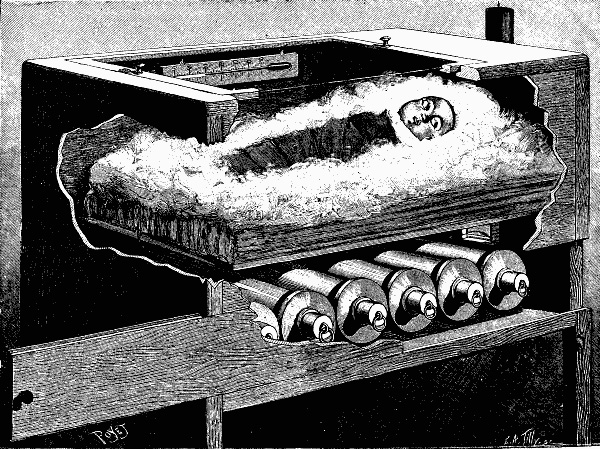
All the journals have recently narrated the curious story of the triplets that were born prematurely at the clinic of Assas Street. Placed at their birth in an apparatus constructed on the principle of an incubator, in order to finish their development therein, these frail beings are doing wonderfully well, thanks to the assiduous care bestowed upon them, and are even showing, it appears, a true emulation to become persons of importance.
Every one now knows the incubator or "artificial hen"-that box with a glass top in which, under the influence of a mild heat, hens' eggs, laid upon wire cloth, hatch of themselves in a few days, and allow pretty little chicks to make their way out of the cracked shell.
This ingenious apparatus, which has been adopted by most breeders, gives so good results that it has already supplanted the mother hens in all large poultry yards, and at present, thanks to it, large numbers of eggs that formerly ended in omelets are now changing into chickens.
Although not belonging to the same race, a number of children at their birth are none the less delicate than these little chicks.
There are some that are so puny and frail among the many brought into the world by the anæmic and jaded women of the present generation that, in the first days of their existence, their blood, incapable of warming them, threatens at every instant to congeal in their veins. There are some which, born prematurely, are so incapable of taking nourishment of themselves, of breathing and of moving, that they would be fatally condemned to death were not haste made to take up their development where nature left it, in order to carry it on and finish it. In such a case it is not, as might be supposed, to the exceptionally devoted care of the mother that the safety of these delicate existences is confided. As the sitting hen often interferes with the hatching of her eggs by too much solicitude, so the most loving and attentive mother, in this case, would certainly prove more prejudicial than useful to her nursling. So, for this difficult task that she cannot perform, there is advantageously substituted for her what is known as an artificial mother. This apparatus, which is identical with the one employed for the incubation of chickens, consists of a large square box, supporting, upon a double bottom, a series of bowls of warm water. Above these vessels, which are renewed as soon as the temperature lowers, is arranged a basket filled with cotton, and in this is laid, as in a nest, the weak creature which could not exist in the open air.
Through the glass in the cover, the mother has every opportunity of watching the growth of her new born babe; but this is all that she is allowed to do. The feeding of the infant, which is regulated by the physician at regular hours, is effected by means of a special rubber apparatus, through the aid of an intelligent woman who has sole charge of this essential operation. The aeration of the little being, which is no less important, is assured by a free circulation, in the box, of pure warm air, which is kept at a definite temperature and is constantly renewed through a draught flue. The least variations in the temperature are easily seen through a horizontal thermometer placed beneath the glass.
Thus protected against all those bad influences that are often so fatal at the inception of life, even to the healthiest babes, preserved from an excess or insufficiency of food, sheltered from cold and dampness, protected against clumsy handling and against pernicious microbes, sickly or prematurely born babies soon acquire enough strength in the apparatus to be able, finally, like others, to face the various perils that await us from the cradle.
The results that have been obtained for some time back at Paris, where the surroundings are so unfavorable, no longer leave any doubt as to the excellence of the process. At the lying-in clinic of Assas Street, Doctors Farnier, Chantreuil, and Budin succeeded in a few days in bringing some infants born at six months (genuine human dolls, weighing scarcely more than from 2¼ to 4½ pounds) up to the normal weight of 7½ pounds. -- L'Illustration.
